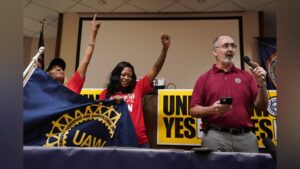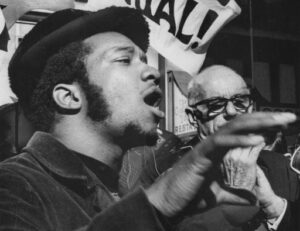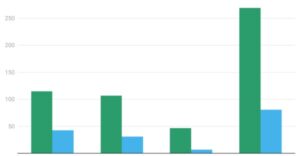Progressives around the U.S. are viewing the April 4 election of Brandon Johnsonas mayor of Chicago as a model for how the broad left and social movements can win. Activist scholar Barbara Ransby, writing in The Nation, cited Johnson’s support from the labor movement, his savvy campaign managers and some key endorsements before adding “it was above all Johnson’s ground game that made all the difference.”As The Nation’s headlineon Ransby’s article put it, “Chicago’s rich organizing tradition paid off.”
Radical journalists Amy Goodman and Dennis Moynihan saw the race between Johnson and right-wing Democrat Paul Vallas as a contest between “democracy” and “fascism,” with Johnson’s win showing that “people power is still a force more powerful.”
Johnson defied the conventional wisdom that expected a squeaker race between him and Vallas with a decisive, if not overwhelming, victory. Based on the Chicago Board of Elections certified count, Johnson took just over 52 percent of the two-candidate vote, winning 319,460 votes, besting Vallas by about 26,000 votes.
Johnson won with a city-wide vote that relied on receiving about 80 percent of the votes cast in majority black wards (city council districts), taking six of the 14 Latino plurality or majority wards, and running up large margins in high-turnout multi-racial, white plurality wards along the densely populated (and relatively more affluent) lakefront north of the downtown core.The campaign’s organizationmay have helped in boosting the turnout of voters younger than35just enough to give Johnson the edge.
Before the left rushes to hail the Chicago election as the latest “grassroots peoples’ victory” it’s worth remembering that just under 39 percent of registered voters turned out for the April 4 runoff, a figure that was up from the still-abysmal 36 percent turnout in the February 28 runoff election.The overall city turnout was higher than 2019’s landslide for outgoing Mayor Lori Lightfoot, but lower than 2015’s decisive victory for Rahm Emanuel. The turnout in the wards Johnson won was mostly lower than those that Vallas won, but Johnson’s support covered wider areas of the majority Black and Brown city. And while Vallas spent twice as much money as Johnson, Johnson’s was hardly a “shoe-string” operation, spending more than $10 million throughout the campaign.
One way to judge the scale of Johnson’s win is to compare it to the 1983 mayoral election of Harold Washington, the city’s first Black mayor, against a racist campaign behind the formerly unknown Republican Bernard Epton. On multiple occasions, Johnson and his supporters drew explicit parallels between his campaign and Washington’s.But Washington won about 51.7 percent of the vote with an 82 percent citywide turnout. To illustrate how this compares to 2023, consider that Epton won about 619,000 votes in losing. Fewer votes—about 612,000—were cast in the entire mayor’s race (for both Johnson and Vallas) in the 2023 contest.
In turning back the “law and order” Vallas, did Johnson defang the appeal of “tough on crime” politics that usually sink liberals’ fortunes?Even in a campaign that turned largely on the issue of crime, spiking in Chicago during the pandemic, Johnson won by pledging to be “tough and smart” on crime. What he didn’t do was win as a champion of “defunding the police” or presenting himself as an “abolitionist.” In fact, for most of his campaign against Vallas, he retreated from calling “defunding the police” the “political goal” he called in in the wake of George Floyd’s murder in 2020. By the end of the campaign, he was pledging not to cut “one penny” from the city’s already bloated police budget. In other words, Johnson won, in part, not by defeating “tough on crime” politics but by redefining them.
The avowedly abolitionist activist Damon Williams, writing in the The Triibe, had this assessment:
On the campaign trail, Johnson made promises about police, policing and police investment that weren’t aligned with an abolitionist framework. He walked back his previous statement on defunding the police being a political strategy, and said he wouldn’t cut CPD’s budget at all. I think, as strategic calculus, that made sense and can be understood. I actually don’t know anybody who is demanding that he abolish the police department in his first term or his first 100 days. That is not the political reality we’re at.
But the message that investment in policing is a path towards safety is just a false premise that actually supports our oppression. So even though it may have been needed strategically to defend against some political attacks I think that messaging affirmed our opposition’s values and principles.
The question is whether Johnson can even meet these low expectations. Activists may hold out hope, but Johnson will be facing other pressures that come with the territory of assuming the role of the chief executive officer of the 3rd largest city in the U.S., and one of the richest cities in the world. And he will do so as a “rising star” in the Democratic Party, which chose the city as the site of its 2024 convention days after Johnson’s election.“[The Democrats are] betting Johnson can help them tell a multicultural, multigenerational Democratic story that their geriatric presidential nominee can use as a springboard to energize young voters and win four more years in the White House,” wrote John Byrne and Rick Pearson in the Chicago Tribune.
Johnson’s Democratic Party bonafideswere not incidental to his campaign. In fact, his messaging as “the real Democrat” was fundamental to defeating Vallas, a conservative Democrat who had enough dalliances with the Republicans and MAGA politicians to boost his toxicity in the one-party Democratic city. “The ‘Republican’ attacks were just too much to overcome,” an unnamed Vallas adviser told Huffington Post.
For most of the Chicago left who supported Johnson, his openly proclaimed loyalty to the Democratic Party made little difference to them. See, for example, here or here. Others with a history of commitment to politics independent of the two capitalist parties acknowledge that Johnson is, one convoluted phrase, a“Democratic-affiliated Cook County commissioner,” but nevertheless emphasized his support from United Working Families (UWF), an electoral vehicle driven mainly by the Chicago Teachers Union and other public sector unions in the city. Rampantcalled UWF’s endorsement of Johnson a “step forward toward independence from its 2015 campaign for Chuy García.”In 2015, U.S. Rep García was also a “Democratic-affiliated Cook County commissioner.”
Socialists who supported Johnson may want to downplay his Democratic Party credentials. But Johnson certainly isn’t. And the solutions he’s seeking—greater social spending through increased taxes on business and the rich—are firmly within the mainstream of the progressive wing of the Democratic Party that he identifies with. He is not a maverick that party bosses are going to have to discipline. If anything, his rhetoric emphasizes a certain cross-class liberalism in which all Chicagoans—business and labor, North Side and South Side, “multi-racial and multigenerational”—can come together to solve the city’s problems.
Another reminder of his commitment to mainstream liberalism was his stated opposition to “boycott, divestment, sanctions” against Israel and his conflating of opposition to the Israeli state with antisemitism.
Business overwhelmingly backed Vallas in the mayor’s race. But Politico noted that one of the first callsJohnson made after he finished his victory speech April 4 was to the CEO of the World Business Council, the organization that virtually ran the city’s economic policy under “Mayor 1%” Emanuel. In an interview with local PBS journalist Brandis Friedman, Johnson said his post-election discussions with business leaders “have been incredible, and the outreach I’ve started from the moment that I accepted the results last week and what every single business leader has indicated to me, whether they are a CEO or an owner, they want what’s best for the city of Chicago. And they’ve said repeatedly, ‘What do you need? How can we help?’ And, and that really captures the essence of what I’ve been saying since I declared my candidacy a year ago.”
Socialist teacher Kirstin Roberts, who proposed a winning resolution at the 2015 United Working Families convention to commit the organization to form a political party to run against the two bosses’ parties, endorsed Johnson and called for socialists to join his campaign in 2023. Looking forward to the incoming Johnson administration, she asked:
What happens when Johnson moves to pass taxes on corporations or their real estate transactions? The assumption should be that bosses will fight back, threaten to leave Chicago, and take jobs with them. How do Johnson and the Left that elected him respond? What happens when the cops fight Johnson’s reform attempts? Will he move to appease them and their vocal right-wing support or can he help organize Chicagoans to resist? And of course, staring down the real possibility of recession during Johnson’s term, how will the city budget be reimagined to secure the funding we need to make good on the promises of fully funded schools, public transit, and health care?
These are all important questions. But they hinge on the idea that the Johnson administration will fight for his campaign promises, and that he will help “organize” the “Left that elected him” to fight back.
What if all these assumptions are wrong, or, more concretely, based on an assessment of Johnson and his relationship with his supporters grounded more in wish casting than in looking reality in the face? Johnson’s early positioning with business doesn’t sound confrontational, nor does business seem to view him as much of a threat. Democratic Illinois Governor J.B.Pritzker has already thrown cold water on Johnson’s call for a financial transaction tax that he had hoped would help fund his program. Loyal Democrat that he is, Johnson is unlikely to buck Pritzker, one of the honorary co-chairs of his inauguration, who is very likely bankrolling the DNC’s 2024 party in Chicago. Johnson’s tapping of Daley era official Richard Guidice as his chief of staff was “a move that could help assure Chicago’s political establishment and business community that a Johnson administration won’t rock the boat as much as they may fear,” wrote the Chicago Tribune’s city hall reporters.
Johnson made some definite promises: ending the city’s contract with ShotSpotter gunfire detection;end the city’s database of supposed gang members; reopen the city’s mental health clinics (closed under Emanuel) and assign mental health professionals rather than police to respond to non-violent emergency calls; pass a “mansion tax” to fund programs to deal with the homelessness crisis; create thousands of summer jobs for youth. He will face the expiration of the CTU contract in 2024. How will he deal with the DNC in Chicago? He’s already getting unsolicited advice from has-beens like the former police chief Garry McCarthy about how to militarize the city for the DNC like Rahm did for the NATO conference in 2012. There will be many markers by which to judge the Johnson administration over the next four years.
And what of the “Left that elected” Johnson? Johnson’s transition team includes leaders of trade unions and community organizations that form the core of UWF. This is no surprise. But it does set up a dynamic whereby these organizations, invested in the Johnson administration’s success, will now become his chief defenders and apologists. As Johnson staffs his administration, anumber of community organizers will take their places in City Hall offices and advisory boards.
After attending the Chicago Teachers Union House of Delegates meeting that took place following Johnson’s election, teacher/journalist Jim Vail reported:
Former Chicago Teachers Union President Jesse Sharkey proclaimed a New Chicago Machine would emerge after the election of the CTU’s very own Brandon Johnson.
“They attacked the CTU for being a political machine which gave out tax breaks to rich developers and wealthy businesses,” said Sharkey, who is now a citywide delegate teaching at South Shore High School. “It was a cruel ridiculous attack on us. I want to build a different machine.”
This “new machine” is supposed to press the corporations to pay their fair share. But given the dynamics of electoral politics—where there is always another election to plan for—and where Johnson will be looking to shore up his support, that “new machine” can become the vehicle by which Johnson’s wing of the Democratic Party co-opts another generation of activists. And how many social movement activists willbecome more fixated on electoral politics than on movements in the streets?
This isn’t “inevitable” and “nothing is set in stone,”critics of the analysis above will say.But it’s a phenomenon with a lot of history behind it. Not just Chicago history. The more recent international experience of left electoral projects—most stemming from higher levels of social struggle and political organization than exist in Chicago today—points in the same direction. Activists who are willing to take UWF’s rhetoric about forming “a party of our own” seriously should ask themselves: After four years of a Johnson administration, will Chicago be closer to having aparty independent of the Democrats? Or will Johnson’s wing of the Democratic Party become its new establishment?
Lance Selfa
Lance Selfa is the author of The Democrats: A Critical History (Haymarket, 2012) and editor of U.S. Politics in an Age of Uncertainty: Essays on a New Reality (Haymarket, 2017).




